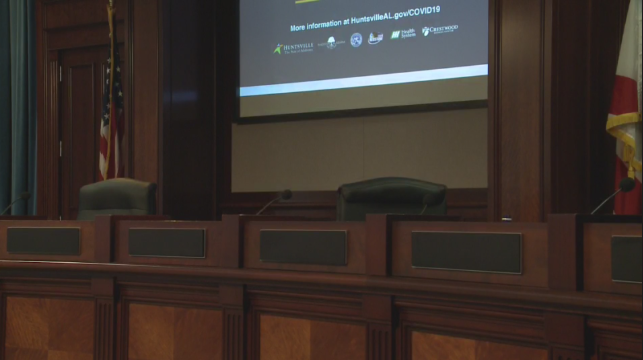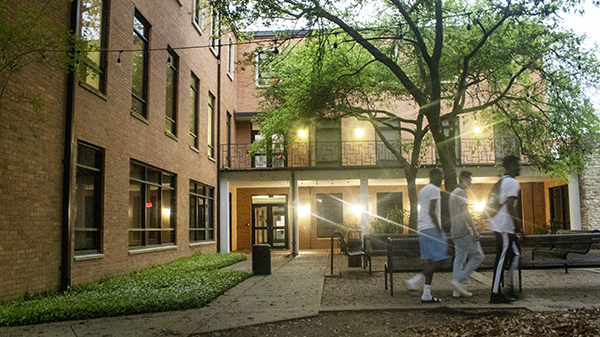America is polarized. The ideological rift continues to grow wider, impacting not just politicians in the major political parties but friends and neighbors alike. And there’s one issue that has come to exemplify this divide perhaps more than any other: immigration reform.
Conservatives have generally called for closing the nation’s borders to outsiders, constructing a massive border wall and deporting millions of illegal immigrants. In contrast, liberals have generally insisted on maintaining open borders, streamlining a pathway to citizenship and granting amnesty to millions of undocumented migrants.
Yesterday, the Criminal Justice Department at Sam Houston State University hosted Houston immigration attorney and SHSU graduate Emma Cantu at their Real Talk with CJ event. Cantu specializes in deportation cases, which have become one of – if not the – most polarizing issues in American politics today.
Impact on SHSU
Last month, Republican presidential candidate Sen. Ted Cruz of Texas, who was born in Canada to Cuban immigrant parents, said he supported the mass deportation of the estimated 11.5 million undocumented immigrants in the United States, joining GOP presidential frontrunner Donald J. Trump.
A Cruz presidency’s mass deportation program would impact over 100 students here at SHSU.
At the beginning of this semester, there were approximately 131 undocumented immigrants paying in-state tuition rates enrolled at SHSU, according to Assistant Vice President for Institutional Effectiveness Donna Artho.
In 2001, the Texas Legislature passed House Bill 1403, also known as the Texas Dream Act, which extends in-state tuition rates and grant eligibility to undocumented residents of Texas.
In 2003, a total of 24,770 non-citizen students, or 1.9 percent of the Texas students in higher education, paid in-state tuition under HB 1403, according to the Texas Higher Education Coordinating Board.
Passed with bipartisan support 15 years ago, some Texas Conservatives today are now calling for the repeal of the Texas Dream Act, the first state law of its kind in the nation.
According to SHSU Political Science professor Ashley Ross, Ph.D., opponents of the law argue it is unfair to taxpaying, U.S. citizens in Texas.
“[Opponents say] that we’re giving privilege to non-citizens while still requiring out-of-state tuition from U.S. citizens, and that it uses taxpayer funds to subsidize the higher education costs for unauthorized residents,” Ross said. “With the state funds in particular, that has become an acute issue in our state in the last five years because we’ve seen significant cuts to higher education funding on the state level.”
Not only is it a financial burden on the state’s treasury, but according to SHSU economics professor Hiranya Nath, PhD., the Texas Dream Act also provides a “moral hazard problem.”
“Those people who consider entering the United States illegally might look at this policy as an incentive to come over because they will think that once they get into the U.S. their children’s education will be taken care of,” Nath said.
Nath, an Indian immigrant himself, suggested that a comprehensive immigration policy should focus on making the process of legal immigration easier, not addressing the concerns of those already here illegally.
Texas House District 18 run-off candidate Ernest Bailes said that in-state tuition should only be available to legal residents and citizens, citing a “neglect” of the federal government to enforce the nation’s immigration laws.
“You don’t teach people to respect the law by rewarding them for breaking it,” Bailes said. Instead, we must uphold the rule of law, commit to enforcing it, and make sure nobody is given favorable treatment because they have broken immigration laws in the past.”
On the other hand, those in favor of the Texas Dream Act contend that providing these tuition rates to undocumented immigrants is an investment in our state’s future, according to Ross, who added that legal or not, “these youth are here to stay.”
“[The thinking is] that we should invest in this segment of the population now so they don’t become a drain on our public services later, if they’re going to be here regardless,” she said. “So let’s enable them and give them an opportunity to get a college degree that would otherwise be unaffordable, so they can get good jobs and become contributing members to our society.”
Economically speaking, it doesn’t seem to make any difference whether someone is undocumented or not, according to economics professor Don Freeman, Ph.D.
“Even if you’re an undocumented alien you’re still paying into the system in the form of state sales and property taxes,” Freeman said. “The rational for in-state tuition is that we want to educate our own, and undocumented immigrants are here and they contribute.”
SHSU economics professor Darren Grant, PhD., agreed with Freeman about the overall positive effects of immigration. And, he added, college graduates (regardless of citizenship status) are far more likely to benefit Texans both economically and socially.
“An educated population is more likely to be employed, less likely to be on welfare, less likely to commit a crime, more likely to have intact families and more likely to be socially engaged and be a part of the citizen body as a whole,” Grant said.
To be eligible for in-state tuition rates – a privilege not granted to non-U.S. citizen students who entered legally – an undocumented student must have resided in Texas while attending high school, graduated from a high school in Texas, have resided in Texas for at least three years prior to graduating high school and the student must sign an affidavit indicating their intent to apply for permanent resident status as soon as possible.
A broken system
Cantu said deporting millions of illegal migrants is simply not plausible, citing the fact that the federal government can’t keep up with the deportation orders it has now.
“For the people who have already been ordered to leave, the government’s immigration agencies are so inadequately resourced that they are not able to enforce the deportation orders,” Cantu said.
Cantu said if a person is not considered a huge security risk or a danger to the community, the agencies won’t enforce the order. The government will keep tabs on the individual by having them report to immigration offices but they won’t actually force the individual out of the country.
Cantu added that not enforcing the nation’s deportation laws may actually encourage illegal immigration.
“Knowing that the United States most likely won’t deport you even if you’re apprehended, combined with an application process that can take up to 10 years or more, leaves little incentive for a desperate migrant to enter legally,” she said.
Still, the nation’s illegal migrant flows are more the result of an inefficient immigration system, not necessarily the migrants, according to Cantu.
“I think that if they had a faster, more understandable way of doing it legally they would,” she said. “They don’t necessarily want to be here illegally, from what I’ve seen, they’re not proud to be here illegally. But for whatever reason they feel like they had to come.”
Arwen Consaul, Public Affairs Officer for the U.S. Citizenship and Immigration Services (UCIS), disagrees with the notion that the process is too slow.
According to Consaul, before applying for U.S. citizenship an immigrant has to be a Green Card holder for a minimum of five years, but once that mandated waiting period is up it’s a relatively quick process.
“To be honest, [the application process] is pretty fast,” Consaul said. “Following that waiting period, once you apply to become a citizen it’s only six months from filing the paperwork to going to your naturalization ceremony.”
Battle lines drawn
Views on immigration fall largely along party lines, with both Democrats and Republicans going to their ends of the ideological spectrum, according to Ross.
“Conservatives generally see immigrants as threatening our national values and ideals, threaten our security and our economic interests,” she said. “Liberals in general are more receptive to immigrants and support open borders, seeing the diversity gained both socially and economically as a good thing.”
The millennial generation, who make up the predominant age group of college students, are far more likely to be receptive to their undocumented peers, according to research conducted by Ross.
“Our findings indicate that even in the face of poor economic conditions that disproportionately impacted millennials, this cohort’s attitudes toward immigration are quite resilient,” Ross said. “When asked in a recent survey about illegal immigration, 69 percent of millennials say that newcomers strengthen society, while only 44 percent of baby boomers said the same thing.”
Immigration reform has been far less controversial in Texas, despite being a state with a large immigrant population.
With everything on the state level largely dominated by Republicans, Texas politics have shown a pattern of pro-business. To discriminate against undocumented residents in Texas – an estimated nine percent of the state’s workforce – is not necessarily a politically savvy move for a legislature, according to Ross.
The state’s growing Hispanic population, who are projected to be the majority by the year 2039, is another factor that has led to milder political rhetoric regarding immigration in Texas, Ross said.
“So taking strong stances that are highly anti-immigrant hasn’t really been what conservative lawmakers do in our state,” Ross said. “What they do instead is moderate immigration reform.”
Economic Impact
Suddenly removing the estimated 11.5 million illegal immigrants from the nation’s labor force would have devastating effects on the economy, according to multiple SHSU economic professors.
“Generally, most of the studies indicate that [immigrants] actually have a positive effect on the economy,” Freeman said. “The addition of these workers into the labor force often result in employment in jobs that are difficult to find natives to do. They come over here to work, they’re here with a purpose and that purpose is to better their lives and contribute to society.”
However, not all Americans benefit from undocumented immigrant labor.
“It is true that certain sub-groups of the native population will suffer,” Freeman said. “They would be the lower income, less educated and less qualified members of the workforce.”
Grant agreed with Freeman and also noted that removing the estimated five million undocumented immigrants in Texas – who make up nine percent of the state’s workforce – would be particularly unkind to the state’s large agricultural sector.
“If you reduce the number of undocumented workers that you have harvesting our crops, then it’s going to help wages for [low-income workers] but it’s also going to make food much more expensive, which hurts everyone who buys food,” Grant said.














